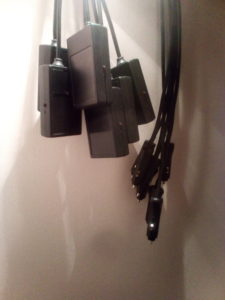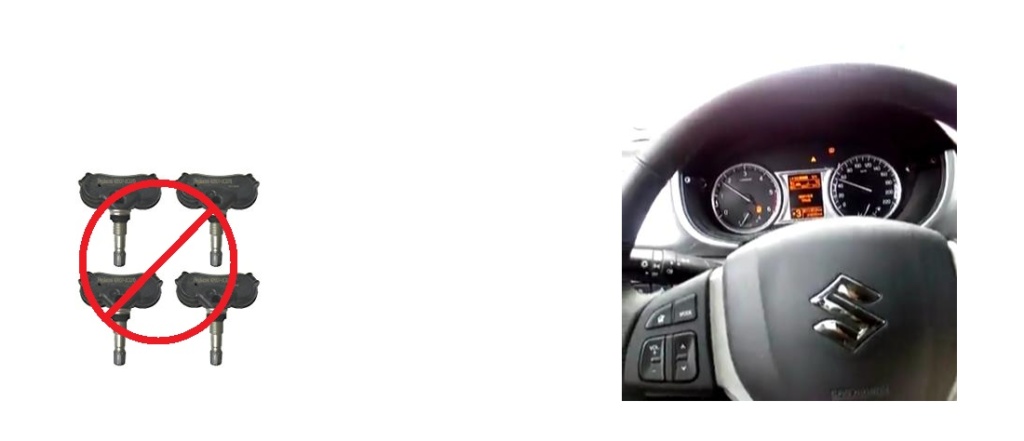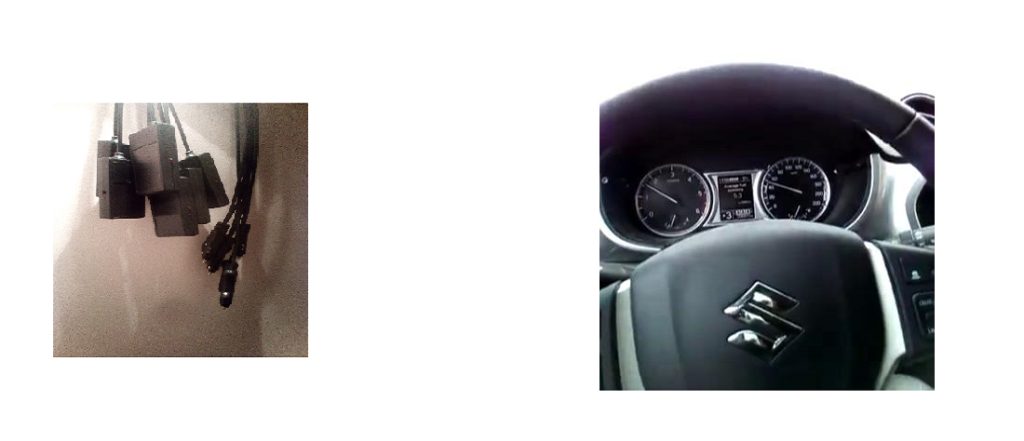The first assembled Suzuki TPMS sensors simulating modules:

Hurrah, “Service TPMS” yellow screens no more!
No TPMS sensors fitted to the rims ?

This nasty yellow screen gets hold of your dashboard computer. A more convenient solution to the problem:

This simulator device is basically a TPMS bypass, or TPMS disable solution. It makes the vehicle’s computer think it has pressure sensors on all wheels and everything is fine. As a consequence, the Service TPMS error and the accompanying “Christmas tree” lights that you experience will clear out leaving the dashboard just as it looks with the original tire pressure sensors (TPMS sensors) mounted on your Suzuki. No other wired connection to the vehicle aside from the 12 V input needed for this. The battery powered device does not require even that. 1, 2, 3 or 4 sensors can be simulated by the device, regardless of whether or not real sensors are installed on the vehicle. This device is also good for overriding the Low Tyre Pressure message when the auxiliary learning procedure is followed.
The simulation is reversible – unplug the device and the yellow screen will show up again. This device will serve its purpose just fine for the entire life of the vehicle, for both summer and winter tires.
The device works with the following European Suzuki models, equipped with transmitter model S180052024 (OEM code 4313961M00) and A2C15319501 (OEM code 4313052S01):
- Alto ( 06/2014- )
- Baleno ( 09/2015- )
- Carry Van ( 04/2015- )
- Celerio ( 04/2013- )
- Grand Vitara( 06/2014 – )
- Ignis ( 01/2016 – )
- Jimmy ( 06/2014 – )
- Kizashi ( 06/2010 – )
- Swift ( 08/2013 – )
- SX4 ( 08/2014- )
- SX4 S-Cross ( 08/2013- )
- Vitara ( 01/2015- )
Which one to chose: corded or battery powered ?
The permanent place of operation for the device is in the vehicle’s boot. The corded device needs a 12 V power outlet inside the boot, and costs 10 euros more due to more parts and labour involved. Otherwise the battery version will work just fine for a predicted 3 – 5 years of daily two hours driving, on all of the vehicles above, in most cases.
The batteries are replaceable (2 x AA). However, for prolonged periods of non-use and especially if the car sits under the scorching sun then there is the risk for them to leak. Avoid that by screwing and unscrewing 4 screws and pulling the batteries out when not using the vehicle for more than 2 – 3 months. This does not happen all that often though; how many times did you find your spent remote control batteries having leaked ? Then again, remote controls are kept at room temperature.
Also, for those of you with a lot of really cold days throughout the winter: the alkaline chemistry is not suited for the job. They retain about 16% capacity at -17 C (0 F) and 66% at 0 C (32 F). Once the alkalines deplete either switch to the more costly lithium AA bateries – good down to -40 C ( -40 F); also they got a non leaky chemistry. Or go for the corded device.
As far as I know most New Vitara, all S-Cross and some New Jimny models have the 12 V power socket in the boot. Of course, you may install or already have installed a 12 V socket in the boot after purchasing the car.
Feel free to drop any questions.
The modules are priced at €50-battery / €60-corded
Payment and shipping for international customers
1. Through Paypal. Shipping via tracked Snail Mail @ 5 euro. Use the buttons below for ordering.
Total cost: 50 [+10 for corded] + 5.
The corded version:
The battery version:
2. Through Credit Card – Shipping via tracked Snail Mail @ 5 euro.
Total cost: 50 [+10 for corded] + 5.
The corded version:
The battery version:
3. Through Transferwise – Use the Delivery Credentials Form and I shall send you a request for 55 / 65 euro. Shipping via tracked Snail Mail @ 5 euro.
Total cost: 50 [+10 for corded] + 5.
For local customers in Romania 50 EUR (or 230 lei, battery) / 60 EUR (or 275 lei, corded):
1. Through Paypal. Shipping via tracked Snail Mail @ 2 euro. Use the buttons below for ordering.
Total cost: 50 [+10 for corded] + 2 EUR.
The corded version:
The battery version:
Should you prefer paying in RON please use the Delivery Credentials Form
2. Through Credit Card – Shipping via tracked Snail Mail @ 2 euro.
Total cost: 50 [+10 for corded] + 2.
The corded version:
The battery version:
Should you prefer paying in RON please use the Delivery Credentials Form
3. Through Transferwise – Use the Delivery Credentials Form and I shall send you a request for 52 (or 240 lei) / 62 euro (or 285 lei). Shipping via tracked Snail Mail @ 2 euro (or 10 lei).
Total cost: 50 [+10 for corded] + 2.
Return policy
The price for only the device (shipping excluded, meaning only 50/60 EUR) will be reimbursed in the following circumstances:
- No more than 60 days from the date you have received the device have passed;
- I am not asked for any fees for the returned item – I will not be accepting such items, so please be careful;
- The device is still operational and physically not damaged.
Should the device break on its own (without much aid from the human factor), there is 1 year of warranty.
Of course, you probably want the tire pressure sensors simulator device working with your Suzuki, so be sure to ask for help if need be. Please also be aware that this is not a plug & play device. A few steps are required in order for the device to calibrate and for the vehicle to learn it. Not hard, but just so you know. Find here the detailed setup instructions for the Iron Gates TPMS simulator module and at the beginning of this page the Demo video button.
Facebook reviews.
eBay reviews.
0 Feedbacks
(Page 0 of 0)
Ebay Feedbacks
Feedback
Buyer
When

